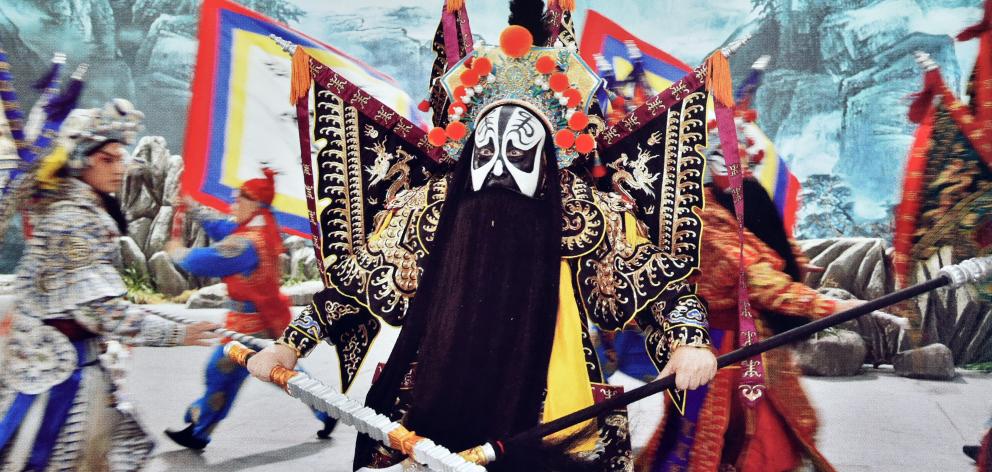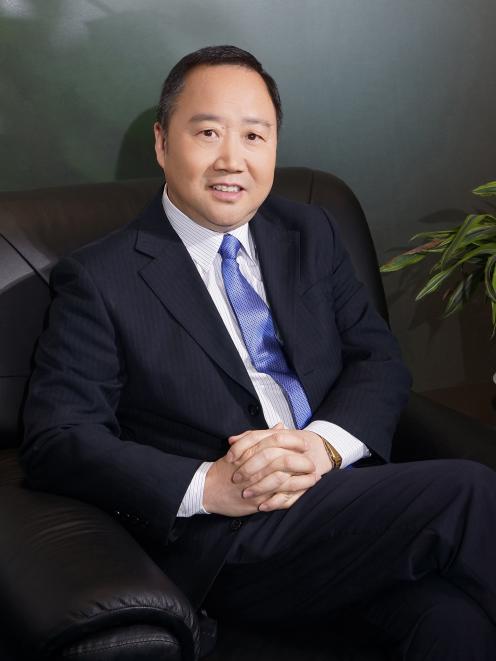
A 3-D film version of a traditional Chinese stage opera might not be everyone’s cup of tea, yet Farewell My Concubine: the Peking Opera has pulled off the delicate trick of pleasing traditionalists while appealing to a new audience, according to its director.
Teng Junjie, one of China’s leading film and television executives, visited Dunedin as part of a large high-powered Chinese delegation at the end of March.
The visit, which also marked the city’s first official China Film Festival, has been described by Dunedin Mayor Dave Cull as a "major coup" for the city and another way to showcase the strong relationship between Dunedin and its Chinese sister city, Shanghai.

The visit was organised in partnership with the New Zealand Film Commission, the Ministry of Foreign Affairs and Trade’s Shanghai office and the Shanghai Film Federation.Through an interpreter, Teng points out his project is not to be confused with the 1993 film of the same name, although both involve the legend of ancient hero Xiang Yu and his concubine Yu.
"The opera tells the story of Xiang Yu, who battled for the unification of China with Liu Bang, the eventual founder of the Han Dynasty."
In the finale of the piece, Xiang Yu is surrounded by Liu Bang’s forces and on the verge of defeat; he calls for the company of his favourite concubine, Consort Yu. Realising the dire situation, she commits suicide with Xiang Yu’s sword (as does Xiang later).
"If I could draw an analogy, I would say Xiang is the Chinese version of Spartacus. He is a hero of his time, even though he loses the fight."
Released in 2014, Farewell My Concubine: The Peking Opera won the Golden Lumiere Award in Los Angeles in 2015, a first for a Chinese film. It was also nominated for a Chinese Golden Rooster Award (best theatre movie), and has been archived by the United States Library of Congress as well as leading US universities.
"I would still describe the film as more of an art-house film than a blockbuster. It’s not competing with big Hollywood films, but people still love it," Teng explains.
"Peking Opera has a tradition, although not so many people are watching it these days.
"I enjoy it, but at the same time, because I’ve worked in the television and film industry for more than 30 years, I’m able to objectively look at it and use modern technology to tell the story. This includes the use of 3-D.
"I aimed to re-create this old story, yet attempt to draw the attention of a younger audience. Technology can therefore serve as the link between the old and the new, so everyone can appreciate this form of art."
Peking Opera is believed to have started around 1790, when four troupes from the province of Anhui visited Beijing to perform. By the end of the 19th century, Peking Opera had become the most acclaimed opera form in China, and Beijing the centre of the theatre scene. In 2010 Peking Opera was declared an ‘‘Intangible Cultural Heritage’’ by Unesco.
Peking Opera plays can be broken into two forms: Civil plays (wenxi) focus on the relationships between characters, and tell stories of love and intrigue. Farewell my Concubine is one such example. Martial plays (wuxi) typically focus on acrobatics and martial arts.
"Peking Opera has a lot of classic operas but I’d say Farewell My Concubine is at the top," Teng, also editor in chief of the Shanghai Media Group, says.
"So I didn’t make huge changes to the storyline itself. At the same time, we were transferring a stage performance to the screen so some changes were made.
"Sometimes in stage performances, the pace can be really slow; the actors are required to walk and act in a certain way. But on the big screen, a lot of those slower parts were shortened and there was more focus on the conflicts.
"Also we used camera angles to make scenes more powerful for the audience. Doing it as a film means we can draw the audience into a scene more. I realised that if you respect the art form and the story and not let technology get in the way ... I was trying to appeal to both traditionalists and those who might fancy a more modern approach.
"Peking Opera has always been a good topic for films. In 1905, the first motion picture film in China was from the opera Ding Jun Shan. There is a long connection between Peking Opera and the cinema."
A respected industry figure in China who has also directed a range of events, including the opening ceremony of the 2007 Fifa Women’s World Cup and the opening and closing ceremonies of the 2010 Shanghai World Expo, Teng has recently completed filming a third Peking Opera show, and will be focusing on that on his return to China.
He also plans on returning to New Zealand.
"In the future I’m interested in collaborating with New Zealand directors and producers, as well as strengthening ties between the Chinese and New Zealand film industries."












